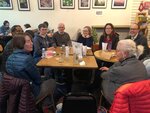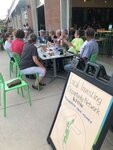By Jan Willms
Community is the key word for Transition Town All St. Anthony Park (TTASAP) and Local Investment Opportunity Network (LION).
TTASAP is a neighborhood volunteer group in St. Anthony Park, focused on climate action and creating a lower carbon footprint “It follows the interests of who is participating,” said Allie Rykken, who volunteers with the group.
She said Transition Town is an international movement that started in Ireland in 2005, focusing on neighborhoods and what the community could take control over.
“There was a national gathering at Macalester College in 2017, with a class on localizing communities,” Rykken said. Transition Towns have broadened their focus, not only working with climate change but at all the challenges a community faces economically and in other ways.
“How can we take money out of corporate Wall Street and bring it home to Main Street?” asked Rykken. She said this is the phenomenon the financial system is built off. “We need to actually transition our money concept.”
Rykken said these ideas are espoused in Michael Shuman’s book “Put Your Money Where Your Life Is.” In it, he tells how to set up self-directed IRAs and how to look for and develop generative businesses.
“Transitioning your money is like exploring broader concepts,” said Rykken who has been helping out with the LION aspect of Transition Town. She said LION participants can ask a lot of questions about how business operates, how to instill their values, and how to set up legally sound agreements as they are looking to invest.
“LION looks at supporting local regenerative socially responsible initiatives or projects,” Rykken added. She said LION is really a networking event that holds gatherings quarterly.
“Within the last year, we have had quarterly networking events,” Rykken said. “We invite people who are interested in local investments to come and hear about opportunities. We can’t have an actual pitch, but we can get people together and have conversations. They can connect later. It is based on the LION program out of Washington State.”
Rykken said the southern part of the St. Anthony Park neighborhood overlaps with the Creative Enterprise Zone, an area trying to support people with creative interests. She said a real estate investment co-op is hoping to start offering memberships in March.
“The project is lined up, but needs to prepare,” Rykken explained. “Seeing the turnover in artists and business owners and each time a building sells, the rent going up, with the co-op (people) would be able to buy some of the buildings in that area and keep the rent under control.”
Rykken said the idea of a co-op had its beginnings when a building on University Avenue changed hands and 300 artists were displaced.
“We’re trying to find a place for people, and we’re pretty excited that this aligns with what we are trying to support. We’re still trying to find our niche with investments that fit our values and are possible for normal people who want to put their money into things. We are not dealing with millions of dollars and not making a ton of work for people needing investments. It’s kind of a unique platform,” she explained.
The LION group has been meeting at different coffee shops and restaurants around the area, according to Rykken. “There are just a few of us organizing it, but we are planting a lot of seeds with different development centers and groups doing cool things,” she said. “Society is heading in the direction of local investments. We’re just not there yet.”
Rykken said there is an email list of 70 for LION, with about 10 in attendance at each meeting. “We do try to get speakers, folks who want to talk about their businesses. So far we have not had a lot of investors come, but it will grow as we continue to have more opportunities,” she said. Rykken noted that the owner of Gingko’s talked about what it is like to be a small business owner in St. Paul, the obstacles to getting loans, and the landscape of the city and how it has changed over the years.
“We have different topics each time, and we hope in the future to have two or three speakers for each quarterly meeting,” Rykken said. She added that a lot of attendees are neighbors who want to put money into something that will benefit their local community.
“The biggest challenge is getting the word out that this is an option, and finding people who would like to invest and try to find a spot where they would come to us rather than a bank. We offer better terms and can connect with people who need funding.”
Rykken said the funding would vary, depending on what people are asking for. “It could be one person investing in a smaller scale project, and the person might need $1,000 to implement the project,” she stated. “One person could loan $1,000 and have it paid back in two years with no interest or 2 percent interest.” According to Rykken, if the project is larger, there might be multiple investors. She said a bank could provide a certain amount of a loan, but there might still be the need for $100,000. “We could open that up to individual investors, so we are looking at these kinds of piecemeal opportunities.”
Rykken said the best way for people interested in learning more about LION is to email lion@transitionasap.org.
“We are excited people are having these conversations about money, and happy to be a small part of this. We are looking forward to seeing what we can do.”


Comments
No comments on this item Please log in to comment by clicking here